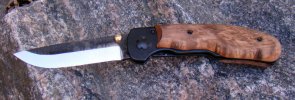And yes, the decision to allow belt knives is a charter decision.
That said, Philmont expressly prohibits fixed blade knives:
http://www.scouting.org/scoutsource/HighAdventure/Philmont/WorkingatPhilmont/equipment.aspx
..and many other scout camps do as well.
So, when I say I follow the rules....I should clarify....I follow Their rules at Their camps....and My rules at My campouts.

Dan
Yes, as noted above, many Councils prohibit fixed-blade knives in their camps. Most of those camps sell fixed-blade knives in their camp Scout Trading Posts and allow their use in wood-carving classes and cooking by Scouts.
Other Councils prohibit "sheath knives" (Is a "cooking knife" kept in a sheath a "sheath knife"? We keep them in sheaths to protect the edges and the Scouts.), "hunting knives" (whatever that means), and "large sheath knives (whatever THAT means.).
If you ask the reason for these bans, you get zip beyond vague references to "Rambo" knives. On that logic (possible misuse), we would ban all motor vehicles, matches, and candy.
Nevertheless, I follow the rules and counsel other to do the same -- while I work, with some success, to get them changed.
The link you supplied is to rules for Staff at Philmont, not participants.
As you may know, Philmont does not have its own website (there is an unofficial website, Philmont.com) but is reached through the main BSA website. Going to the main Philmont page and using "search" to look for "sheath knives" leads to this language: "A sharp pocketknife with a can opener on it is an invaluable backcountry tool. Keep it clean, sharp, and handy.
Avoid large sheath knives. They are heavy and awkward to carry, and unnecessary for most camp chores except for cleaning fish. Since its inception, Boy Scouting has relied heavily on an outdoor program to achieve its objectives. This program meets more of the purposes of Scouting than any other single feature. We believe we have a duty to instill in our members, youth and adult, the knowledge of how to use, handle, and store legally owned knives with the highest concern for safety and responsibility." [emphasis added].
Again noting the irrationality of using a filleting knife as an example of a "heavy and awkward" knife and of failing to teach youth how to safely use a very common tool (common to Scouting even in the suppsoed banning Councils), this language is standard BSA wording. It appears in the Boy Scout Handbook and Guide to Safe Scouting. As a trainer, I deliver that language to adults multiple times a year.
I have discussed this issue with our Council's Philmont Coordinator, and he was unaware of any rule prohibiting sheath knives or fixed-blade knives for participants at Philmont. If something has changed, it would be nice to see it in writing.
Having said that, weight control dictates not carrying a heavy knife that one is unlikely to use at Philmont.


